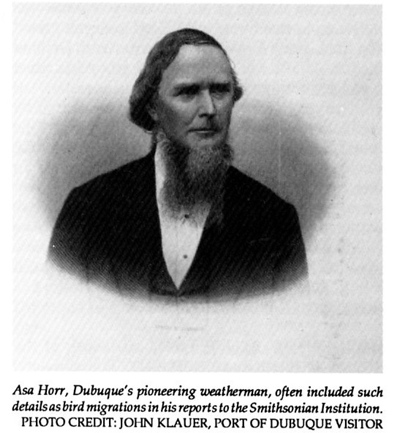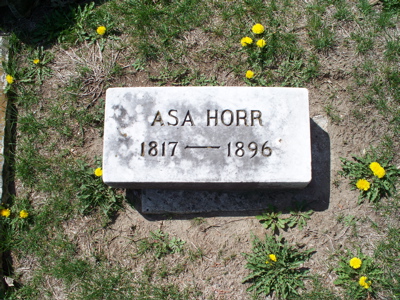Encyclopedia Dubuque
"Encyclopedia Dubuque is the online authority for all things Dubuque, written by the people who know the city best.”
Marshall Cohen—researcher and producer, CNN
Affiliated with the Local History Network of the State Historical Society of Iowa, and the Iowa Museum Association.
HORR, Asa: Difference between revisions
No edit summary |
No edit summary |
||
| Line 1: | Line 1: | ||
[[Image:imp202.jpg|right|thumb| | [[Image:imp202.jpg|right|thumb|250px|]]HORR, Asa. (Worthington, OH, Sept. 2, 1817--Dubuque, IA, June 2,1896). Dubuque's first weatherman. In 1847 Horr settled in Dubuque where he developed the Iowa Institute of Science and Arts. A true man of science, Horr owned one of the finest chemical and medical libraries in the state as well as a superb collection of geological and plant specimens. | ||
Being one of few Iowans capable of telling time from the stars, Horr was appointed the official regulator of the town clock, a position he held for twenty years. One of the leading surgeons in eastern Iowa, Horr was also a prominent supporter of building the original [[TOWN CLOCK]]. The longitude of Dubuque was determined using his astronomical transit. | Being one of few Iowans capable of telling time from the stars, Horr was appointed the official regulator of the town clock, a position he held for twenty years. One of the leading surgeons in eastern Iowa, Horr was also a prominent supporter of building the original [[TOWN CLOCK]]. The longitude of Dubuque was determined using his astronomical transit. | ||
Between 1851 and 1871 Horr measured the rain and snowfall, recorded the temperature in the city and reported his information to the Commissioner of Patents and the Smithsonian Institution. His reports often carried unusual additional comments concerning the amount of river [[ICE]], notes about the bird migrations, and remarks about the success of the harvests. He was gradually eased out of the weather gathering business by the government as the United States Army Signal Corps took charge in 1873. | Between 1851 and 1871 Horr measured the rain and snowfall, recorded the temperature in the city and reported his information to the Commissioner of Patents and the Smithsonian Institution. His reports often carried unusual additional comments concerning the amount of river [[ICE]], notes about the bird migrations, and remarks about the success of the harvests. He was gradually eased out of the weather gathering business by the government as the United States Army Signal Corps took charge in 1873. | ||
[[Image:asahorr.jpg|right|thumb|250px|Gravestone in Linwood Cemetery]] | |||
[[Category: Scientist]] | [[Category: Scientist]] | ||
[[Category: Weather]] | [[Category: Weather]] | ||
Revision as of 00:40, 18 April 2010
HORR, Asa. (Worthington, OH, Sept. 2, 1817--Dubuque, IA, June 2,1896). Dubuque's first weatherman. In 1847 Horr settled in Dubuque where he developed the Iowa Institute of Science and Arts. A true man of science, Horr owned one of the finest chemical and medical libraries in the state as well as a superb collection of geological and plant specimens.
Being one of few Iowans capable of telling time from the stars, Horr was appointed the official regulator of the town clock, a position he held for twenty years. One of the leading surgeons in eastern Iowa, Horr was also a prominent supporter of building the original TOWN CLOCK. The longitude of Dubuque was determined using his astronomical transit.
Between 1851 and 1871 Horr measured the rain and snowfall, recorded the temperature in the city and reported his information to the Commissioner of Patents and the Smithsonian Institution. His reports often carried unusual additional comments concerning the amount of river ICE, notes about the bird migrations, and remarks about the success of the harvests. He was gradually eased out of the weather gathering business by the government as the United States Army Signal Corps took charge in 1873.



